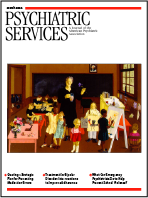In Reply: We thank Drs. Hoge, Messer, and Castro for their careful review of our article and for their comments. We agree that our results do not represent a prevalence rate of PTSD in the community of survivors of the terrorist attack. As we noted in our discussion, the generalizability of the findings is limited because of the low response rate and unknown selection biases. As we noted in our methods section, our goals were to examine the effects of previous life experiences, exposure during the attack, initial emotional response, and peritraumatic dissociation on subsequent PTSD symptoms, substance use, and current perceptions of safety seven months after the attack. Our criteria for probable PTSD certainly include individuals with subsyndromal PTSD.
Our findings indicate robust associations between our measure of PTSD and peritraumatic dissociation, initial emotional response, and current perception of a lower level of safety, which were the areas of interest. We found it noteworthy that in our sample, the degree of direct exposure to the attack was not related to the presence of PTSD symptoms seven months later.
The item about alcohol use was not intended to identify individuals with alcohol use disorders. As we reported, it identified those who may have used alcohol as a coping behavior without the presence of an alcohol use disorder. Our study also found negative health consequences associated with this often overlooked behavior.
Great caution must be used in attempting to generalize results from survey research to the rates of psychiatric illness in the community after terrorism (
1). Each terrorist act has a unique impact on the targeted population, and findings cannot be routinely applied to larger populations. Understanding the longer-term impact of terrorism on health, health care utilization, and changes in perception and behavior requires examination of the affected groups over time and against other samples. As we observed in our sample, early markers identified participants who were more likely to have ongoing difficulties. Understanding the vulnerabilities and mechanisms of postterrorism disturbances in function is perhaps more important than attempting to define the prevalence of disease within populations or large samples within populations. Long-term follow-up studies have found that participants who have mild forms of psychiatric illness at baseline are more likely to continue to be ill at follow-up than those who do not have illness at baseline (
2), which suggests that identifying individuals with subsyndromal symptoms may be as important as identifying those who have more severe symptoms.

